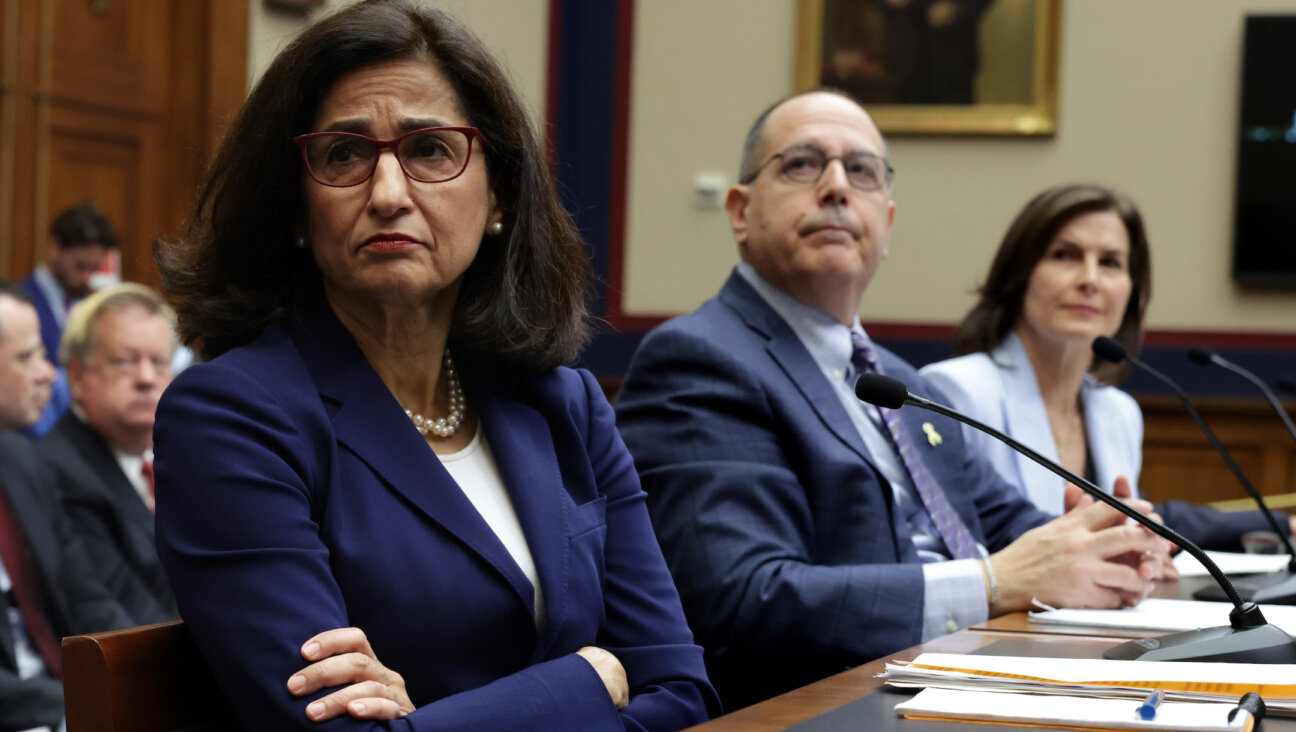How Hillary Clinton Soothes Israel Backers at Convention — by Stressing Daylight With Barack Obama

Image by Getty Images
PHILADELPHIA — For Israel, would a Hillary Clinton administration continue the tone set by Barack Obama? Or would she be a much warmer and closer friend to the Jewish state?
It depends who and what you want to listen to at this Democratic convention
On one end of the liberal spectrum, there was the burning of an Israeli flag outside the convention hall Tuesday night by angry protestors. And on the other, a widely noticed gesture by former president Bill Clinton, who wore a Hebrew language Hillary lapel pin on prime time TV.
In between there was a whole lot of public silence—and a double set of messages sent out to activists, depending on their political leaning: For those hoping the next president will keep the heat on Israel, a promise that a Clinton will follow in the footsteps of the current president. But for Jewish Democrats who felt unease with the Obama’s fraught relationship with Israeli leaders, a pledge to turn the page.
“We’re not here to run President Obama’s third term.’ Hillary Clinton’s record stands on its own,” said Sarah Bard, the Clinton campaign’s director of Jewish outreach.
But on stage Wednesday night, President Obama, in front of a roaring crowd, delivered a speech that was all about continuity, or as the president put, his readiness to “pass the baton.”
Israel, once an easy applause line at Democratic gatherings, has become a lightning rod this time around, in no small part due to the call by Senator Bernie Sanders of Vermont, Clinton’s campaign rival, for a change in the party’s approach to the Israel-Palestinian issue. While defeated in his attempts to change the party’s platform on the issue, Sanders and his supporters proved throughout the convention that they remain a force to be reckoned with. On the convention’s opening day, dozens of delegates wore stickers expressing their support for the Palestinians. Later, some activists—they would almost certainly have to have been delegates to have had access—rolled a Palestinian flag out on the floor of the convention, sending out a clear message that this battle was not over.
“I don’t think it’s a large segment of the party,” said Bard, adding: “look at the final vote on the platform and look at the final language.”
Tensions surrounding the issue of Israel at the convention were also seen in the roles played by pro-Israel lobbying groups: One focused its work behind the scenes; the other sought front stage.
The American Israel Public Affairs Committee, the Washington-based establishment Israel lobby, was once known for its impressive convention receptions, both at Republican and Democratic gatherings. This year, the lobby initially rented out the Philadelphia Jewish Museum for a planned reception, but decided last month to drop the event. The reason had little to do with the Democratic event, one informed Jewish activist suggested. It was instead, he said, a matter of balance, since the lobby found itself unable to stage a reception the week before at the GOP convention when its board members balked at being associated with did not want to be associated with Trump. Instead, AIPAC focused on smaller meetings with activists, donors, and policy makers, and on closed-door gatherings at the Democratic Party’s gathering.
Ironically, it was J Street, AIPAC’s rival which lobbies for Israel from a dovish standpoint, that took the venue and hosted a high-profile reception Wednesday evening, boasting an impressive lineup of elected officials.
“It is a shift in the dynamic,” said a former Obama administration official who attended events of both lobbies.
At the end of the day, however, the Democratic Party succeeded in its balancing act on Israel.
The convention managed to keep controversies over Israel under wraps and away from public eye. Moving forward, the Clinton campaign will continue stressing the language of the platform, not the internal battle that preceded it.
Laura Rosenberger, the Clinton campaign’s foreign policy adviser in charge of Middle East affairs, said that if elected, Clinton will fulfill her promise of inviting Netanyahu to the White House in her first month in office.
“She believes we need to jump in and from a very early point get on the same page and ensure that we have a real strategic vision, a common shared vision,” Rosenberger said. The senior aide also made clear that while Clinton remains committed to a two-state solution, she does not necessarily have a new peace plan ready to roll out once elected. “She knows that its a different time now and that there’s a lot of issues that we need to contend with and that it has to be something that the two parties come together on, but she believes that the United States needs to play a leadership role in helping set the conditions,” Rosenberger said.
This statement could send a calming message to many at AIPAC who fear an aggressive push for a new peace plan that would pressure Israel beyond its comfort zone. It was accompanied by a pledge to oppose any attempt to move the Israeli – Palestinian conflict into the international arena, allowing bodies like the United Nations to impose a solution. This too has been a hot button issue for AIPAC.
And in a nod to those still hoping for a vigorous drive to reignite the peace process, Rosenberger stated that despite Clinton’s lack of success in moving the sides closer during her tenure as Secretary of State, she is not ready to throw in the towel. “She’s a fighter and she doesn’t give up just because something’s tough,” she said.
Contact Nathan Guttman at [email protected] or on Twitter @nathanguttman

I hope you appreciated this article. Before you go, I’d like to ask you to please support the Forward’s award-winning journalism this Passover.
In this age of misinformation, our work is needed like never before. We report on the news that matters most to American Jews, driven by truth, not ideology.
At a time when newsrooms are closing or cutting back, the Forward has removed its paywall. That means for the first time in our 126-year history, Forward journalism is free to everyone, everywhere. With an ongoing war, rising antisemitism, and a flood of disinformation that may affect the upcoming election, we believe that free and open access to Jewish journalism is imperative.
Readers like you make it all possible. Right now, we’re in the middle of our Passover Pledge Drive and we need 500 people to step up and make a gift to sustain our trustworthy, independent journalism.
Make a gift of any size and become a Forward member today. You’ll support our mission to tell the American Jewish story fully and fairly.
— Rachel Fishman Feddersen, Publisher and CEO
Join our mission to tell the Jewish story fully and fairly.
Our Goal: 500 gifts during our Passover Pledge Drive!
























